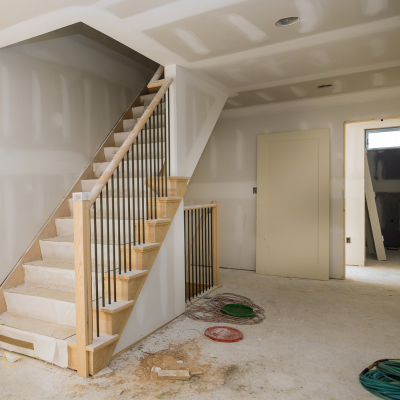Here’s a comprehensive blog post on choosing the right flooring for your basement when finishing, remodeling, or renovating. It includes an SEO-focused approach, optimized to meet a keyword density of 0.6% for the keywords basement remodeling, basement finishing, and basement renovation, while providing in-depth, unique information.
How to Choose the Right Flooring for Your Basement Finishing, Remodeling, or Renovation Project
Choosing the right flooring for your basement can be a challenging decision, whether you’re finishing, remodeling, or renovating. With basements, you have unique considerations like moisture, temperature, and use of space. Selecting the right flooring not only enhances the look and feel of your basement but can also protect your investment, prevent future issues, and create a comfortable space for you and your family.
In this guide, we’ll explore the best flooring options for basement finishing, basement remodeling, and basement renovation, considering durability, cost, and maintenance to help you make the right choice for your needs.
Key Factors to Consider When Choosing Basement Flooring
Before diving into the types of flooring available, it’s essential to understand the factors that affect flooring choices in basements. Basements often experience unique environmental challenges, and choosing the right flooring can help manage these issues. Here are the main factors to consider:
- Moisture Resistance: Basements are prone to moisture from below the foundation and surrounding soil, which can affect flooring. Choose flooring materials that are moisture-resistant or waterproof to prevent mold and mildew growth.
- Temperature Fluctuations: Basements tend to be cooler than the rest of the house. Choose flooring that can handle temperature changes and feels comfortable, especially if you’re planning to make it a living space.
- Durability and Maintenance: Consider the level of traffic in your basement. Choose flooring that is durable, easy to clean, and maintain, especially in high-traffic areas like family rooms or entertainment spaces.
- Purpose of the Space: Will your basement be a family room, guest suite, home gym, or playroom? The purpose will impact your flooring choice, as different spaces may require specific features.
By evaluating these factors, you’ll be better equipped to select a flooring option that’s both functional and visually appealing for basement remodeling, basement finishing, or basement renovation.
Types of Flooring for Basement Finishing, Remodeling, and Renovation
Here are some popular flooring choices for basements, each with unique features suited to different types of basement projects.

1. Vinyl Flooring
Vinyl flooring has gained popularity in recent years due to its versatility, durability, and moisture resistance, making it a great option for basements. Available in planks, tiles, or sheets, vinyl can mimic the appearance of wood or stone, giving your basement an upscale look at an affordable price.
Pros:
- Waterproof: Vinyl is highly resistant to moisture, making it ideal for basements prone to dampness.
- Durability: Vinyl flooring is long-lasting and can handle high traffic, scratches, and spills.
- Easy to Install: Many vinyl options are available in interlocking planks or peel-and-stick tiles, making DIY installation straightforward.
Cons:
- Cold Underfoot: While it resists moisture, vinyl can feel cold, so adding an area rug can make the space more comfortable.
- Limited Customization: While vinyl comes in many styles, it doesn’t offer the same natural warmth as real wood or stone.
Best for: Basement finishing projects where moisture is a concern and a stylish, low-maintenance floor is desired.
2. Carpet Flooring
Carpet flooring is a popular choice for creating a cozy, comfortable space, particularly in basements intended for living areas. Carpet provides insulation and absorbs sound, making it a great choice for family rooms, bedrooms, or home theaters.
Pros:
- Warm and Soft: Carpet feels warm and comfortable, which is a benefit in cool basement environments.
- Sound Absorption: Carpet absorbs sound, making it ideal for multi-purpose rooms, playrooms, or entertainment areas.
- Variety of Styles: Available in a range of textures and colors to suit your design preferences.
Cons:
- Prone to Moisture Damage: If moisture is an issue, carpet may not be ideal as it can develop mold or mildew.
- Higher Maintenance: Carpet requires regular cleaning and is more challenging to keep clean in high-traffic areas.
Best for: Basement remodeling projects that aim to create a comfortable, warm, family-friendly space.

3. Tile Flooring
Tile flooring is durable, easy to clean, and highly water-resistant, making it one of the top choices for basements, especially in areas where moisture is a concern. Tiles come in a range of materials, including ceramic, porcelain, and stone, providing options for different styles and budgets.
Pros:
- Water-Resistant: Ceramic and porcelain tiles are highly resistant to moisture, perfect for basements.
- Long-Lasting: Tiles are durable, making them suitable for high-traffic areas.
- Design Flexibility: Tiles come in various colors, textures, and sizes, allowing for customization.
Cons:
- Cold and Hard: Tile can feel cold and hard underfoot, so consider adding rugs for comfort.
- Costly Installation: Tile flooring can be costly to install and may require professional installation.
Best for: Basement renovation projects in damp areas or for spaces like bathrooms or laundry rooms where water exposure is common.

4. Engineered Wood Flooring
For those who love the look of hardwood but need something better suited for basement environments, engineered wood flooring is an excellent choice. Unlike solid wood, engineered wood is made from layers that provide added stability and moisture resistance, making it ideal for basements.
Pros:
- Moisture Resistant: Engineered wood is more stable than solid wood and can withstand slight moisture.
- Stylish and Elegant: It provides the look and feel of hardwood, adding a warm, luxurious appearance.
- Durability: Engineered wood is more resistant to warping than solid hardwood, making it a better option for below-grade areas.
Cons:
- Limited Water Resistance: While more moisture-resistant than hardwood, engineered wood isn’t waterproof.
- Costly: Engineered wood is typically more expensive than vinyl or tile options.
Best for: Basement finishing projects where a high-end, natural wood look is desired without the risk of warping.

5. Laminate Flooring
Laminate flooring is another cost-effective option that can give your basement a hardwood-like appearance. Laminate is made from layers of synthetic materials topped with a printed layer that mimics wood or stone. It is durable and easy to install, making it popular for basement projects.
Pros:
- Affordable: Laminate is generally more affordable than wood or tile flooring.
- Easy to Install: Laminate often features a click-and-lock design, making it ideal for DIY projects.
- Variety of Styles: Available in many designs, including wood and stone looks.
Cons:
- Not Waterproof: Laminate is water-resistant but can be damaged by excessive moisture.
- Cold: Laminate can feel cool underfoot, similar to vinyl.
Best for: Basement remodeling or renovation projects where affordability and style are priorities but water exposure is minimal.

6. Concrete Flooring
For a modern, industrial look, concrete flooring is a durable, low-maintenance option perfect for basements. Many homeowners choose to stain, polish, or seal concrete to give it a more refined appearance.
Pros:
- Highly Durable: Concrete is tough and can withstand heavy use, making it ideal for high-traffic areas.
- Low Maintenance: Requires minimal upkeep, perfect for busy households.
- Water-Resistant: Naturally resistant to water, making it great for basements prone to moisture.
Cons:
- Cold and Hard: Concrete can feel cold and is not as comfortable underfoot as other options.
- Limited Aesthetic Appeal: Concrete has an industrial look that may not suit all design styles.
Best for: Basement renovation projects where durability and water resistance are essential, especially in utility spaces or laundry rooms.
Comparing Flooring Types for Your Basement Project
Choosing the right flooring for your basement largely depends on the specific goals of your basement remodeling, basement finishing, or basement renovation project. Here’s a quick comparison to help you decide:
| Flooring Type | Water Resistance | Comfort | Cost | Maintenance | Best For |
|---|---|---|---|---|---|
| Vinyl | High | Medium | Moderate | Low | Basement finishing |
| Carpet | Low | High | Moderate | Moderate | Basement remodeling |
| Tile | High | Low | High | Low | Basement renovation |
| Engineered Wood | Moderate | High | High | Moderate | Basement finishing |
| Laminate | Moderate | Medium | Low | Low | Basement remodeling |
| Concrete | High | Low | Low | Low | Basement renovation |
Additional Considerations When Choosing Basement Flooring
1. Installation Process and Costs
Some flooring options, like tile and engineered wood, may require professional installation, while others, like vinyl or laminate, are often DIY-friendly. Installation costs can add significantly to your project budget, so consider whether you’ll handle the installation yourself or hire a professional.
2. Maintenance Requirements
Different types of flooring come with different maintenance needs. For example, carpet may need regular vacuuming and occasional deep cleaning, while vinyl or concrete requires minimal upkeep. Consider the amount of maintenance you’re willing to commit to and choose a flooring option that suits your lifestyle.
3. Insulation and Underlayment
For added warmth and comfort, consider using an insulating underlayment with your basement flooring. Many flooring types, like vinyl and laminate, work well with underlayment, which can help insulate the basement floor and make it feel warmer underfoot.
Tips for a Successful Basement Flooring Installation
No matter which flooring you choose, proper preparation and installation are essential for long-lasting results. Here are some tips to ensure a successful basement flooring project:
- Ensure a Dry Surface: Before installing any flooring, make sure your basement is dry. Consider using a moisture barrier to protect against dampness.
- Level the Floor: Basements often have uneven floors. Leveling the surface before installation will help the flooring sit evenly and prevent issues down the line.
- Use Waterproof Materials: Especially for basements prone to moisture, choose waterproof materials or add a waterproof underlayment to protect your flooring investment.
- Consider Area Rugs for Comfort: If you choose a harder flooring option, such as tile or concrete, area rugs can add comfort and warmth to living spaces.
Conclusion: Choose Flooring to Match Your Basement Goals
Selecting the right flooring for basement remodeling, basement finishing, or basement renovation can make a significant impact on the look, feel, and longevity of your basement. Whether you choose the durability of vinyl, the warmth of carpet, the elegance of engineered wood, or the modern appeal of concrete, each flooring type offers unique benefits.
At Complete Basement Remodeling, we’re here to help guide you through the process of choosing the best flooring for your basement needs. Our team of experts can assess your space, recommend suitable flooring options, and handle the installation with precision. Contact us today to get started on creating the basement of your dreams with the perfect flooring to match your vision and lifestyle.

